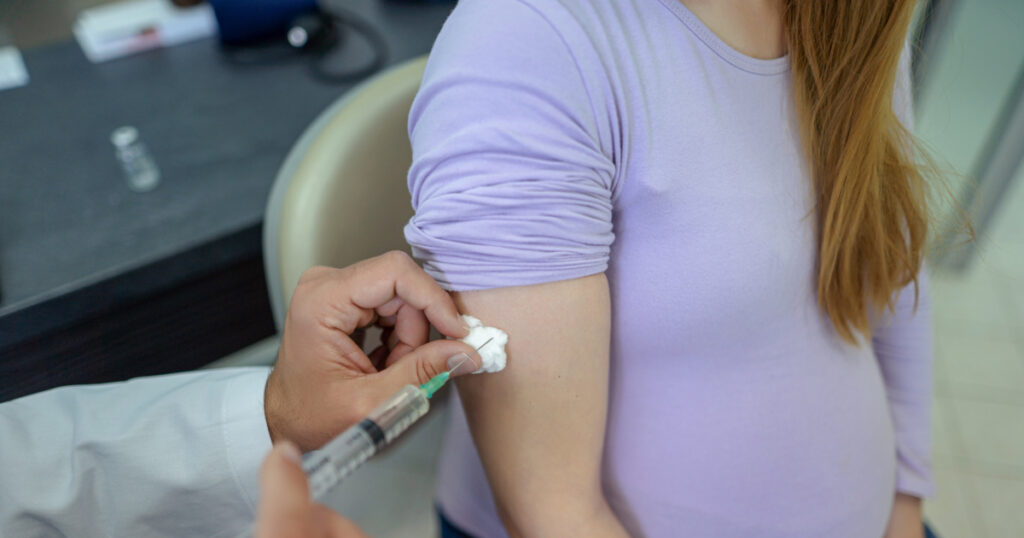
A pregnant young woman receives a vaccine at a preventive examination by a doctor
The launch of the national RSV Mother and Infant Protection Program (RSV-MIPP) in February marked a pivotal moment in safeguarding newborns from severe illness. This initiative followed the inclusion of the maternal respiratory syncytial virus (RSV) vaccine, Abrysvo, into the National Immunisation Program (NIP) a few months prior, an achievement hailed as ‘world leading’ by health experts.
By April, immunisation programs for nirsevimab, marketed as Beyfortus, a long-acting monoclonal antibody for infants not covered by the maternal RSV vaccine, were rolled out across all Australian states and territories, including general practices. Despite this progress, the updates to maternal vaccination guidelines have sparked confusion among healthcare professionals, according to Professor Charlotte Hespe, Head of General Practice and Primary Care Research at the University of Notre Dame.
Challenges in Vaccine Implementation
Professor Hespe emphasized the need for clearer clinical education on maternal immunisation. She explained, “We’ve been incredibly fortunate to get the RSV-MIPP, which provides free access to maternal RSV vaccines for pregnant women at 28–36 weeks gestation. However, the fragmented rollout of the RSV program over the last 18 months has been problematic due to the varied funding sources across the country.”
This complexity is compounded by the coexistence of the NIP and state health-funded programs alongside guidance from the Australian Technical Advisory Group on Immunisation (ATAGI), which advises on vaccination recommendations across Australia. The emergence of RSV in a post-COVID world has further complicated matters, as the virus has become a leading cause of hospitalisations among infants.
Expert Insights and Recommendations
Professor Hespe noted the sudden development of three RSV vaccines, two of which have been approved in Australia with slightly different Therapeutic Goods Administration (TGA) approvals. “Understanding each of those vaccines, offering the right one, and proactively having those conversations with patients is incredibly powerful,” she stated.
Recent data reveals that the number of babies hospitalised with RSV nearly halved in 2025 compared to the same time last year, thanks to the availability of the vaccine and monoclonal antibody.
Despite these promising statistics, Professor Hespe supports calls for improved clarity regarding which vaccine or antibody product to prescribe for specific patient groups. In August, ATAGI issued a statement addressing RSV administration errors that led to some adverse events, which Professor Hespe described as expected given the lack of a unified funding rollout for RSV protection vaccines.
Addressing Confusion and Improving Communication
Professor Hespe highlighted the confusion caused by the similar names of the three RSV products, each targeting different demographic groups. “If we used different language and said ‘we’re giving the babies a monoclonal antibody protection,’ it would clarify for health practitioners that it’s a completely different product,” she explained. She stressed the importance of GPs understanding the specifics of each product and who qualifies for them.
Moreover, she pointed out the need for clear guidelines on the storage and administration of these products. “GPs should have a very clearly labelled system in their fridges and a protocol where two people check off the correct product for the correct patient,” she advised.
The Role of GPs in Vaccination Advocacy
Professor Hespe underscored the importance of GPs in communicating the benefits of RSV vaccination to patients. “Pregnant women want to do everything they can to protect their babies, so understanding the importance of the vaccine between 28–36 weeks gestation is crucial,” she said. She also recommended that GPs encourage older patients to get vaccinated to reduce the spread of the virus.
“If you’re not already talking about it to your patients, do that, because protecting babies by ensuring fewer adults are sick is vital,” she added. “Remember how important your recommendation is for our patients to actually do these vaccinations.”
As Australia continues to lead in RSV vaccination efforts, the focus remains on improving clarity and communication to ensure the safety and effectiveness of these programs. The ongoing dialogue among healthcare professionals and policymakers will be critical in addressing the challenges and enhancing the public health response to RSV.





